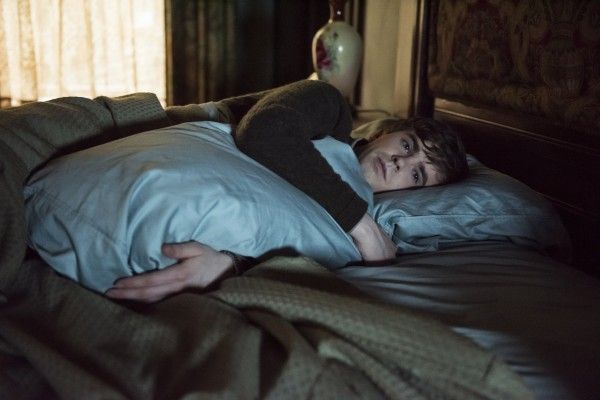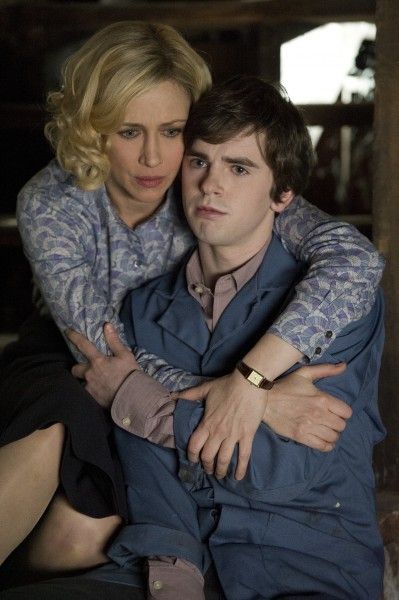There has been a lot written lately about the stakes of TV character deaths recently, because more than ever it’s been hard knowing or trusting whether they are really gone. In shows like The Walking Dead, Game of Thrones, even something as crazy as Legends of Tomorrow, the mechanics of those worlds mean that death isn’t permanent, which sometimes makes it hard to really get invested in other characters’ grief. “Just wait,” you want to tell them. “They’ll be back.”
There are of course plenty of examples where major characters have been killed off and it does matter, hugely. Sometimes it’s because contract negotiations are up, or there’s behind-the-scenes drama, but it’s rare that a show plans to kill off a main character deep into the show’s run as part of that series’ very fabric. One of the triumphs of a show that did do that, Bates Motel, is that even though we know the eventual outcome for Norman and Norma Bates (wonderfully played by TV Performers of the Week Freddie Highmore and Vera Farmiga), it doesn’t lessen the tension. If anything, it heightens it.
For awhile now, it hasn’t been clear how closely Bates Motel would come to Psycho, and whether we would get to Norma’s death and Norman’s complete, murderous break with reality. Though it’s been teased for awhile, Season 4 (the show’s penultimate season) actually took us to a point we’ve been conditioned to dread. The death of Norma, such a hypnotic and luminous character throughout the show’s run, is something almost as inconceivable to viewers as it is to Norman himself. How can Bates go on without her?
The fact is that it won’t — but, it won’t be the Norma we knew. “Norman” was deliciously ghoulish in the way Norman’s grief drove him to the graveyard to dig up his mother and bring her back to their house. In a particularly chilling scene, he glues her eyelids open — revealing her pale irises of the dead — and demands that she look at him. Norma will be preserved physically, just like in Psycho, thanks to Norman’s psychosis mixed with his handiness with taxidermy, but more importantly she’ll be preserved mentally, in Norman’s mind. Will Norman now become Norma like he used to, or will she exist as a separate entity that he talks to regularly? Or both?
“Norman’s” final scene seemed to suggest the latter, with his mental ghost of Norma playing piano, full of Christmas cheer. Killing off Norma before the final season was an exceptionally bold move, even if she’s still returning in the form of a spectre, because of course it’s not her. It’s Norman’s conception of her. She won’t interact with other characters again, which, given how masterful Farmiga was at showcasing Norma’s many moods and emotions with others, is most certainly a loss.
Other shows more grounded in reality than The Walking Dead or Game of Thrones have done similar things to explore grief and death, most notably HBO’s funeral home-centric series Six Feet Under. The dead routinely returned there to haunt the minds living, often in beautiful and poignant ways as characters grappled with the finality of their passing, with the show using them as a foil for the character’s current mental state. Something similar will likely be true for Bloodline, where a major character (and arguably the best character) was killed off in Season 1, but will be returning in everyone else’s memories and guilty consciences in Season 2.
Bates Motel has certainly had its ups and downs over the years, particularly when it tried to expand its drug subplot or the machinations of the evil, rich folks of White Pine Bay. But Season 4 settled in and did away with all of that. It cut out ancillary characters and focused back on Norman and Norma, and their closest relationships, and was much better for it. It even dared to diagnose Norman, but also allowed him to escape the fate of being committed, just as he was no doubt escape prosecution for murdering his mother. We know that because we know how the story ends. And yet, Bates Motel has been an example of how fantastic a prequel series can be in creating its own world and its own stakes.
Norman is not the only one affected by Norma’s death, as much as he seems to think he is by not inviting anyone to her funeral. In a heart-wrenching scene, Dylan calls Norman to talk after his blowout with Norma, but Norman doesn’t tell him about her death. Emma doesn’t know, either, and there’s certain to be fallout from all of this. Romero knows, though, and that will be key in the final season. Contrary to Norman’s portrayal of him to the investigator officer, Romero and Norma did have a relationship (albeit not a romantic one) long before their marriage. His grief, and his (correct) understanding that Norman is a killer will likely drive the new season’s tension — even though, again, we know that Norman will prevail.
The excitement, though, lies in how. Yes killing off Norma was shocking and sad, and Norman’s reaction to it was fittingly creepy and horrific, but it shows Bates Motel not just staying true to its premise, but in a way, fulfilling its destiny alongside Norman. It also shows us death is not final, but not because of a cheap trick; it’s because those around us don’t forget. And the beauty and horror of the last few episodes of Bates Motel’s fourth season, and “Norman” in particularly, illustrates that perfectly. It was unforgettable.






